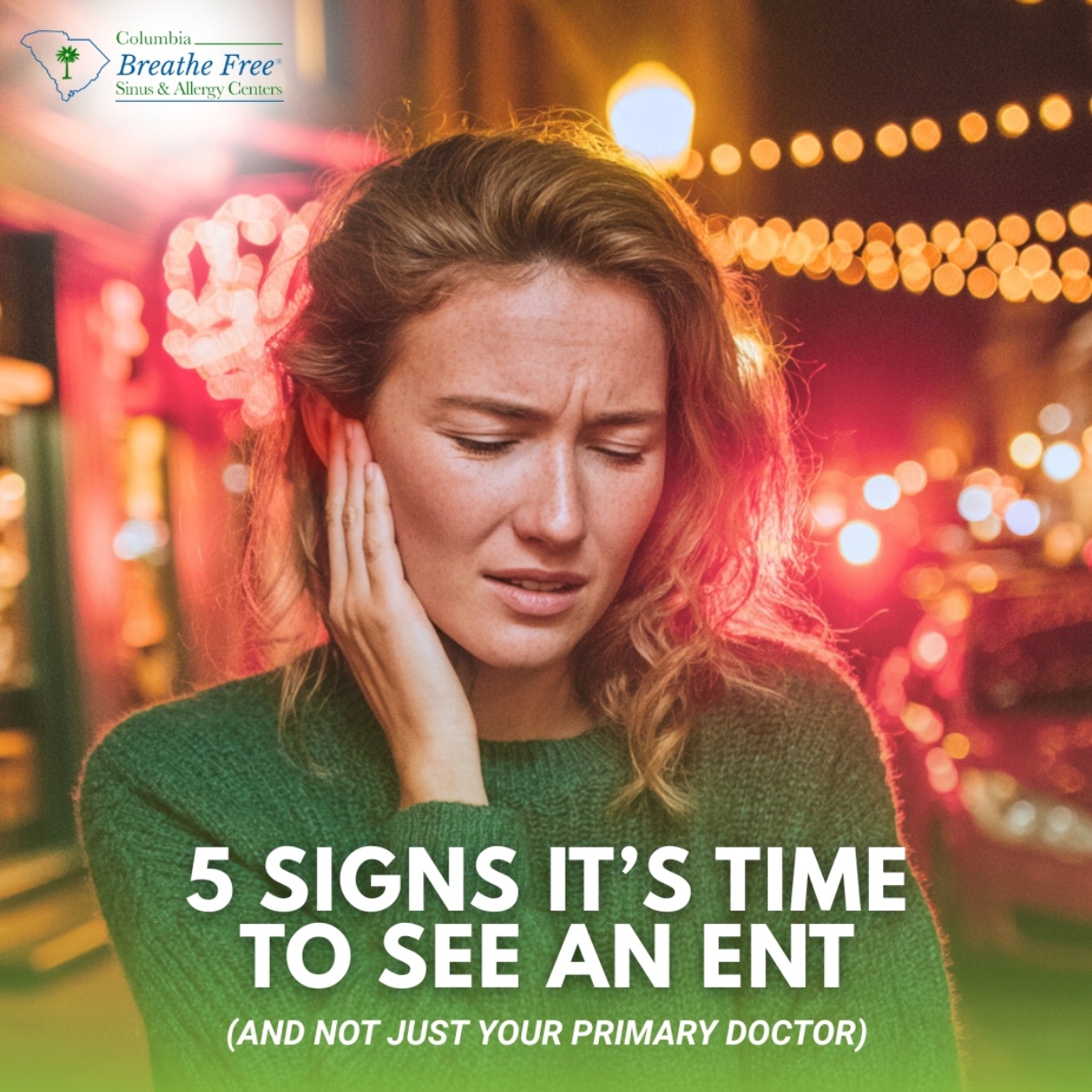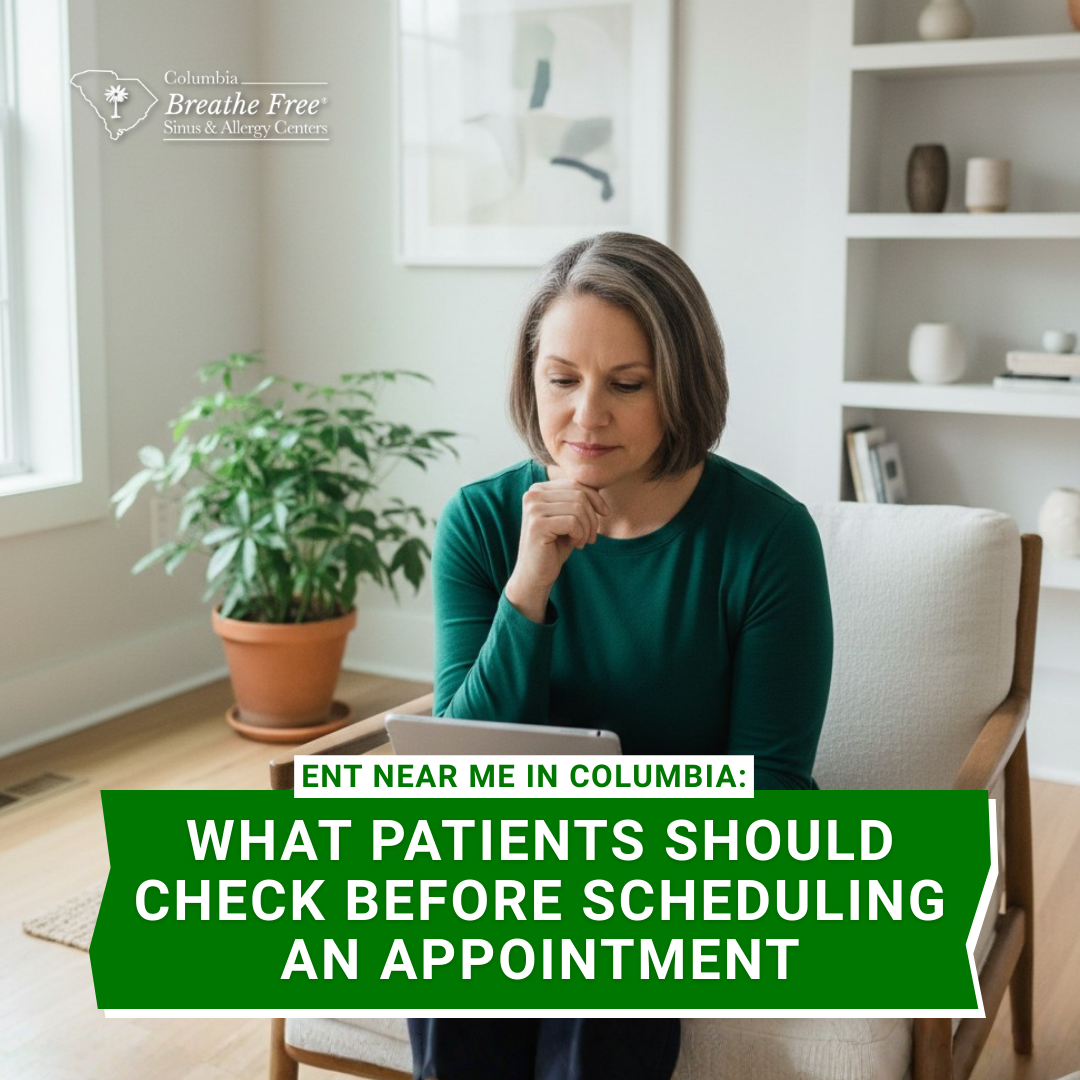
Understanding Spring Allergies in Columbia: Triggers and Treatments
Spring in Columbia, SC, brings blooming flowers, longer days, and—for many—uncomfortable allergy symptoms. If you’ve noticed itchy eyes, a runny nose, or constant sneezing, you’re not alone. Spring allergies in Columbia can be intense, thanks to the mix of tree pollen, grass pollen, and our warm, humid climate.
At Columbia Breathe Free, we understand how frustrating allergy season can be. Although it’s common, you don’t have to just live with it. Knowing what triggers your symptoms and understanding your treatment options is the first step toward long-term relief.

What Causes Spring Allergies in Columbia?
Spring allergies occur when your immune system overreacts to harmless substances like pollen. This reaction triggers the release of histamine, causing inflammation and the classic allergy symptoms. In Columbia, the primary spring allergy triggers are:
- Tree pollen: Oak, maple, birch, and pine trees release fine pollen into the air from late winter through early spring.
- Grass pollen: As spring progresses, grasses like Bermuda, rye, and fescue begin to pollinate, overlapping with tree pollen.
- Mold spores: Humid air and frequent rain help mold thrive outdoors and indoors, growing in soil, fallen leaves, and even in damp indoor areas like air vents and bathrooms.
These allergens combine to make spring especially challenging for those with seasonal allergies.
When Is Pollen Season in Columbia?
In Columbia, pollen season typically starts in February and lasts through June. Tree pollen peaks in March and April, while grass pollen becomes more active in May. The warm climate extends the allergy season, making it longer than in cooler regions.
High pollen counts are common on dry, windy days when particles can spread easily. Although rain can temporarily wash away pollen, it also encourages mold growth in damp areas.
Common Symptoms of Spring Allergies
Spring allergies can manifest in various ways. The most common symptoms include:
- Sneezing and runny nose
- Nasal congestion or sinus pressure
- Itchy or watery eyes
- Cough or sore throat
- Fatigue or trouble sleeping
For some, symptoms may be mild but persistent, while for others, they can be intense enough to disrupt daily routines. If you have asthma or chronic sinus issues, spring allergies may worsen these conditions, sometimes triggering sinus infections or headaches.
Tips for Allergy Relief This Spring
While you can’t avoid pollen entirely, small changes can make a big difference. Here are some tips for managing your symptoms:
- Check daily pollen counts: Websites and apps show local pollen levels. On high-count days, try to stay indoors during early morning and late afternoon when pollen levels are highest.
- Keep windows closed: Use air conditioning at home and in the car to filter the air and prevent pollen from entering.
- Rinse off after being outside: Pollen sticks to clothes, hair, and skin. Shower and change clothes after spending time outdoors.
- Use a saline rinse: A daily saline nasal spray or rinse can help flush out pollen and irritants, easing congestion and reducing the need for medication.
- Try over-the-counter medications: Antihistamines, decongestants, and nasal corticosteroids can help control symptoms. Always follow directions and consult a provider if symptoms persist or cause side effects.
When to See a Provider
If your allergy symptoms are affecting your quality of life, it may be time to seek professional help. At Columbia Breathe Free, we don’t just treat symptoms—we focus on long-term solutions.
We’ll identify your specific allergy triggers and check for signs of chronic sinus inflammation, nasal blockages, or other structural issues that could be exacerbating your symptoms.
Take Back Control of Spring
You don’t have to suffer through spring allergies in Columbia, SC, every year. Whether it's pollen, mold, or a combination, effective treatments are available to help you breathe freely again.
Visit us at Columbia Breathe Free to get to the root of your sinus and allergy symptoms. With the right care and a clear plan, this spring can be about more than just managing your allergies—it can be the season you finally breathe easy.
Other Blogs
.png)
How to Choose the Right ENT for Your Symptoms
When ear, nose, or throat problems don’t go away, it can be hard to know what to do next. Maybe your nose always feels blocked. Maybe your ears feel full, or your throat keeps bothering you. These issues can affect sleep, focus, and daily life. At Columbia Breathe Free Sinus & Allergy Centers, patients often ask how to choose the right ear, nose, and throat doctor—also called an ENT—for their symptoms. While no visit can promise answers or outcomes, knowing what to look for can help you feel more confident before scheduling an appointment.

5 Signs It’s Time to See an ENT (and Not Just Your Primary Doctor)
If you’ve ever dealt with persistent ENT issues like chronic nasal congestion, recurring ear infections, severe sinus pain and pressure, and hearing difficulties, then you know how they may affect your daily life, productivity, and comfort, depending on their severity. Many patients today are taking a more proactive approach to their health and may choose to seek care when they notice persistent or worsening symptoms.

ENT Near Me in Columbia: What Patients Should Check Before Scheduling an Appointment
Searching for an “ENT near me” in Columbia often means you’re dealing with ongoing ear, nose, throat, allergy, or sinus concerns. This article explains what ENT providers typically evaluate and how local environmental factors may influence symptoms, along with what to expect during an ENT visit and how treatment options are commonly discussed. It also covers practical considerations before scheduling, including services offered, insurance, accessibility, and appointment availability, and highlights how Columbia Breathe Free helps patients take informed first steps toward understanding and managing persistent ENT, allergy, and sinus symptoms.
The information provided in this article is for informational and educational purposes only and does not constitute medical advice. It is not intended to diagnose, treat, cure, or prevent any disease or medical condition. Always seek the guidance of your physician or other qualified healthcare provider with any questions you may have regarding a medical condition or treatment.
Results may vary: Treatment outcomes and health experiences may differ based on individual medical history, condition severity, and response to care.
Emergency Notice: If you are experiencing a medical emergency, call 911 or seek immediate medical attention.
